Organisational Behaviour: Analysing Power, Culture, and Motivation
VerifiedAdded on 2023/01/05
|16
|5293
|84
Report
AI Summary
This report provides a comprehensive analysis of organisational behaviour, focusing on the impact of power, culture, and politics on individual and team performance within an organisation, using Sainsbury's as a case study. It examines different forms of power, including legitimate, reward, expert, referent, and coercive power, and their effects on employee motivation and productivity. The report also discusses the influence of positive and negative politics on organisational dynamics and explores various cultural typologies, such as power, task, role, and person cultures. Furthermore, it delves into content and process theories of motivation, with a specific focus on Maslow's hierarchy of needs, and discusses the characteristics of effective and ineffective teams, including Tuckman's team development stages. The report concludes by highlighting the importance of cultural difference awareness and the application of Hofstede's cultural dimensions to foster a positive and productive work environment. Desklib provides students with access to this assignment and many other solved assignments.
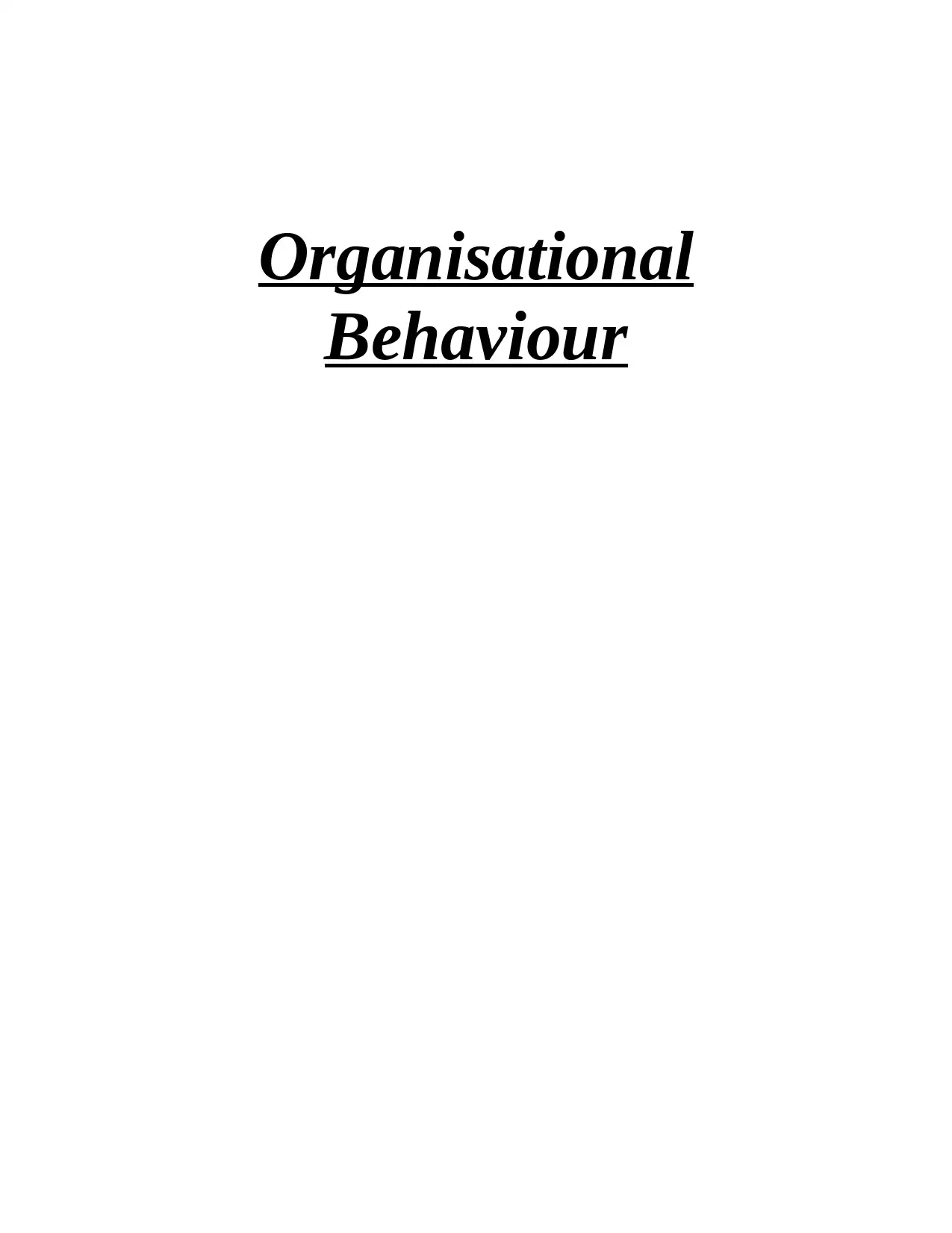
Organisational
Behaviour
Behaviour
Paraphrase This Document
Need a fresh take? Get an instant paraphrase of this document with our AI Paraphraser
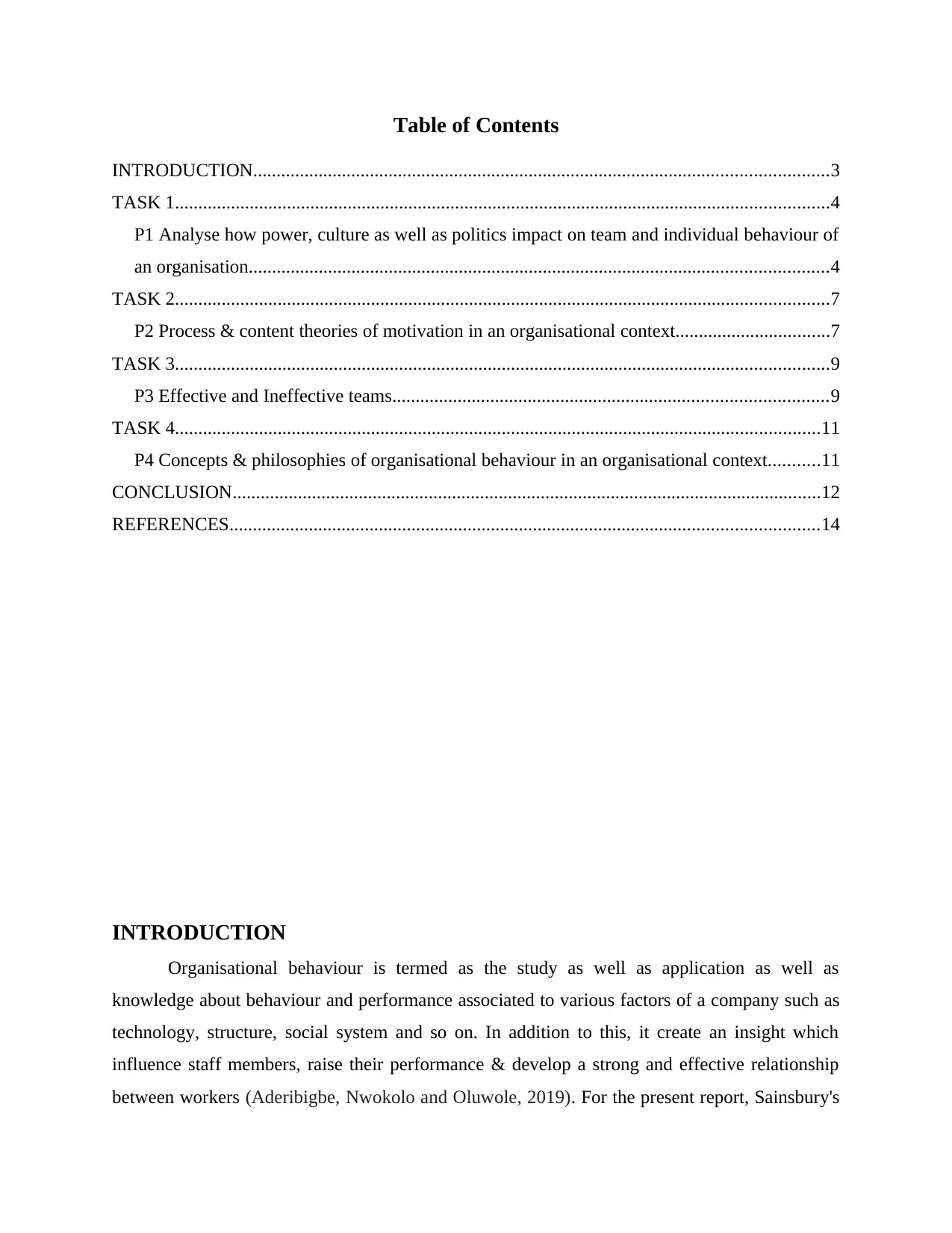
Table of Contents
INTRODUCTION...........................................................................................................................3
TASK 1............................................................................................................................................4
P1 Analyse how power, culture as well as politics impact on team and individual behaviour of
an organisation............................................................................................................................4
TASK 2............................................................................................................................................7
P2 Process & content theories of motivation in an organisational context.................................7
TASK 3............................................................................................................................................9
P3 Effective and Ineffective teams.............................................................................................9
TASK 4..........................................................................................................................................11
P4 Concepts & philosophies of organisational behaviour in an organisational context...........11
CONCLUSION..............................................................................................................................12
REFERENCES..............................................................................................................................14
INTRODUCTION
Organisational behaviour is termed as the study as well as application as well as
knowledge about behaviour and performance associated to various factors of a company such as
technology, structure, social system and so on. In addition to this, it create an insight which
influence staff members, raise their performance & develop a strong and effective relationship
between workers (Aderibigbe, Nwokolo and Oluwole, 2019). For the present report, Sainsbury's
INTRODUCTION...........................................................................................................................3
TASK 1............................................................................................................................................4
P1 Analyse how power, culture as well as politics impact on team and individual behaviour of
an organisation............................................................................................................................4
TASK 2............................................................................................................................................7
P2 Process & content theories of motivation in an organisational context.................................7
TASK 3............................................................................................................................................9
P3 Effective and Ineffective teams.............................................................................................9
TASK 4..........................................................................................................................................11
P4 Concepts & philosophies of organisational behaviour in an organisational context...........11
CONCLUSION..............................................................................................................................12
REFERENCES..............................................................................................................................14
INTRODUCTION
Organisational behaviour is termed as the study as well as application as well as
knowledge about behaviour and performance associated to various factors of a company such as
technology, structure, social system and so on. In addition to this, it create an insight which
influence staff members, raise their performance & develop a strong and effective relationship
between workers (Aderibigbe, Nwokolo and Oluwole, 2019). For the present report, Sainsbury's
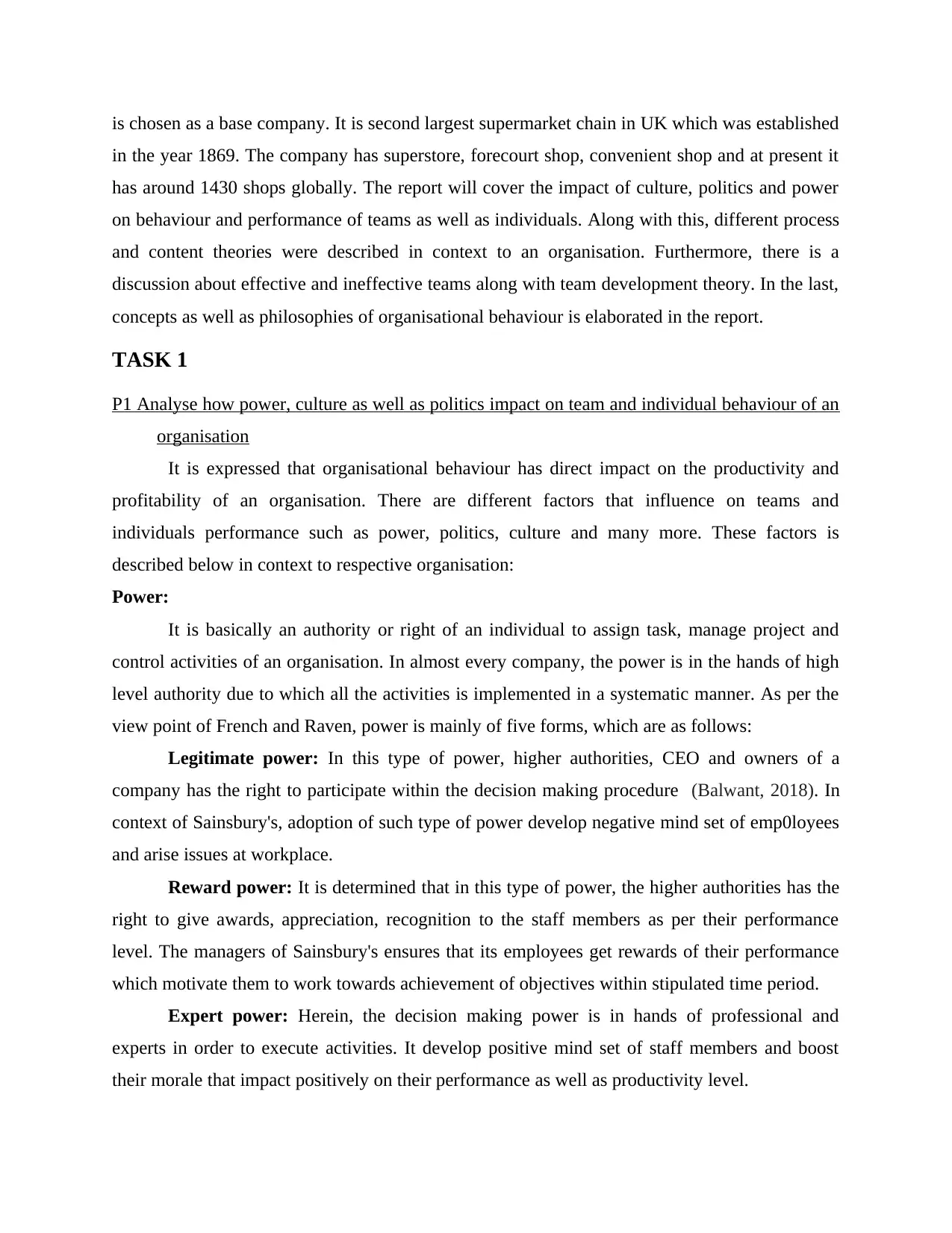
is chosen as a base company. It is second largest supermarket chain in UK which was established
in the year 1869. The company has superstore, forecourt shop, convenient shop and at present it
has around 1430 shops globally. The report will cover the impact of culture, politics and power
on behaviour and performance of teams as well as individuals. Along with this, different process
and content theories were described in context to an organisation. Furthermore, there is a
discussion about effective and ineffective teams along with team development theory. In the last,
concepts as well as philosophies of organisational behaviour is elaborated in the report.
TASK 1
P1 Analyse how power, culture as well as politics impact on team and individual behaviour of an
organisation
It is expressed that organisational behaviour has direct impact on the productivity and
profitability of an organisation. There are different factors that influence on teams and
individuals performance such as power, politics, culture and many more. These factors is
described below in context to respective organisation:
Power:
It is basically an authority or right of an individual to assign task, manage project and
control activities of an organisation. In almost every company, the power is in the hands of high
level authority due to which all the activities is implemented in a systematic manner. As per the
view point of French and Raven, power is mainly of five forms, which are as follows:
Legitimate power: In this type of power, higher authorities, CEO and owners of a
company has the right to participate within the decision making procedure (Balwant, 2018). In
context of Sainsbury's, adoption of such type of power develop negative mind set of emp0loyees
and arise issues at workplace.
Reward power: It is determined that in this type of power, the higher authorities has the
right to give awards, appreciation, recognition to the staff members as per their performance
level. The managers of Sainsbury's ensures that its employees get rewards of their performance
which motivate them to work towards achievement of objectives within stipulated time period.
Expert power: Herein, the decision making power is in hands of professional and
experts in order to execute activities. It develop positive mind set of staff members and boost
their morale that impact positively on their performance as well as productivity level.
in the year 1869. The company has superstore, forecourt shop, convenient shop and at present it
has around 1430 shops globally. The report will cover the impact of culture, politics and power
on behaviour and performance of teams as well as individuals. Along with this, different process
and content theories were described in context to an organisation. Furthermore, there is a
discussion about effective and ineffective teams along with team development theory. In the last,
concepts as well as philosophies of organisational behaviour is elaborated in the report.
TASK 1
P1 Analyse how power, culture as well as politics impact on team and individual behaviour of an
organisation
It is expressed that organisational behaviour has direct impact on the productivity and
profitability of an organisation. There are different factors that influence on teams and
individuals performance such as power, politics, culture and many more. These factors is
described below in context to respective organisation:
Power:
It is basically an authority or right of an individual to assign task, manage project and
control activities of an organisation. In almost every company, the power is in the hands of high
level authority due to which all the activities is implemented in a systematic manner. As per the
view point of French and Raven, power is mainly of five forms, which are as follows:
Legitimate power: In this type of power, higher authorities, CEO and owners of a
company has the right to participate within the decision making procedure (Balwant, 2018). In
context of Sainsbury's, adoption of such type of power develop negative mind set of emp0loyees
and arise issues at workplace.
Reward power: It is determined that in this type of power, the higher authorities has the
right to give awards, appreciation, recognition to the staff members as per their performance
level. The managers of Sainsbury's ensures that its employees get rewards of their performance
which motivate them to work towards achievement of objectives within stipulated time period.
Expert power: Herein, the decision making power is in hands of professional and
experts in order to execute activities. It develop positive mind set of staff members and boost
their morale that impact positively on their performance as well as productivity level.
⊘ This is a preview!⊘
Do you want full access?
Subscribe today to unlock all pages.

Trusted by 1+ million students worldwide
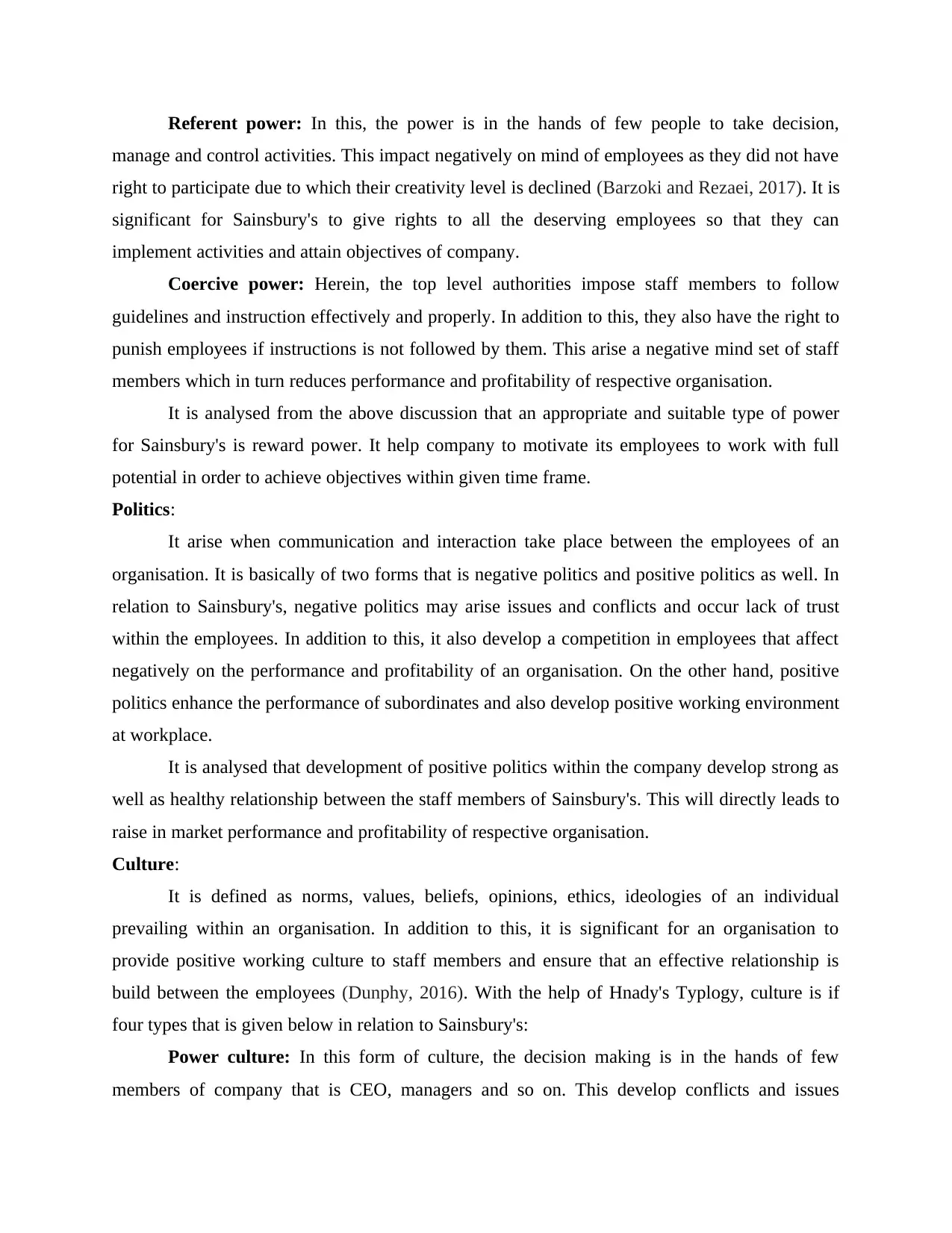
Referent power: In this, the power is in the hands of few people to take decision,
manage and control activities. This impact negatively on mind of employees as they did not have
right to participate due to which their creativity level is declined (Barzoki and Rezaei, 2017). It is
significant for Sainsbury's to give rights to all the deserving employees so that they can
implement activities and attain objectives of company.
Coercive power: Herein, the top level authorities impose staff members to follow
guidelines and instruction effectively and properly. In addition to this, they also have the right to
punish employees if instructions is not followed by them. This arise a negative mind set of staff
members which in turn reduces performance and profitability of respective organisation.
It is analysed from the above discussion that an appropriate and suitable type of power
for Sainsbury's is reward power. It help company to motivate its employees to work with full
potential in order to achieve objectives within given time frame.
Politics:
It arise when communication and interaction take place between the employees of an
organisation. It is basically of two forms that is negative politics and positive politics as well. In
relation to Sainsbury's, negative politics may arise issues and conflicts and occur lack of trust
within the employees. In addition to this, it also develop a competition in employees that affect
negatively on the performance and profitability of an organisation. On the other hand, positive
politics enhance the performance of subordinates and also develop positive working environment
at workplace.
It is analysed that development of positive politics within the company develop strong as
well as healthy relationship between the staff members of Sainsbury's. This will directly leads to
raise in market performance and profitability of respective organisation.
Culture:
It is defined as norms, values, beliefs, opinions, ethics, ideologies of an individual
prevailing within an organisation. In addition to this, it is significant for an organisation to
provide positive working culture to staff members and ensure that an effective relationship is
build between the employees (Dunphy, 2016). With the help of Hnady's Typlogy, culture is if
four types that is given below in relation to Sainsbury's:
Power culture: In this form of culture, the decision making is in the hands of few
members of company that is CEO, managers and so on. This develop conflicts and issues
manage and control activities. This impact negatively on mind of employees as they did not have
right to participate due to which their creativity level is declined (Barzoki and Rezaei, 2017). It is
significant for Sainsbury's to give rights to all the deserving employees so that they can
implement activities and attain objectives of company.
Coercive power: Herein, the top level authorities impose staff members to follow
guidelines and instruction effectively and properly. In addition to this, they also have the right to
punish employees if instructions is not followed by them. This arise a negative mind set of staff
members which in turn reduces performance and profitability of respective organisation.
It is analysed from the above discussion that an appropriate and suitable type of power
for Sainsbury's is reward power. It help company to motivate its employees to work with full
potential in order to achieve objectives within given time frame.
Politics:
It arise when communication and interaction take place between the employees of an
organisation. It is basically of two forms that is negative politics and positive politics as well. In
relation to Sainsbury's, negative politics may arise issues and conflicts and occur lack of trust
within the employees. In addition to this, it also develop a competition in employees that affect
negatively on the performance and profitability of an organisation. On the other hand, positive
politics enhance the performance of subordinates and also develop positive working environment
at workplace.
It is analysed that development of positive politics within the company develop strong as
well as healthy relationship between the staff members of Sainsbury's. This will directly leads to
raise in market performance and profitability of respective organisation.
Culture:
It is defined as norms, values, beliefs, opinions, ethics, ideologies of an individual
prevailing within an organisation. In addition to this, it is significant for an organisation to
provide positive working culture to staff members and ensure that an effective relationship is
build between the employees (Dunphy, 2016). With the help of Hnady's Typlogy, culture is if
four types that is given below in relation to Sainsbury's:
Power culture: In this form of culture, the decision making is in the hands of few
members of company that is CEO, managers and so on. This develop conflicts and issues
Paraphrase This Document
Need a fresh take? Get an instant paraphrase of this document with our AI Paraphraser
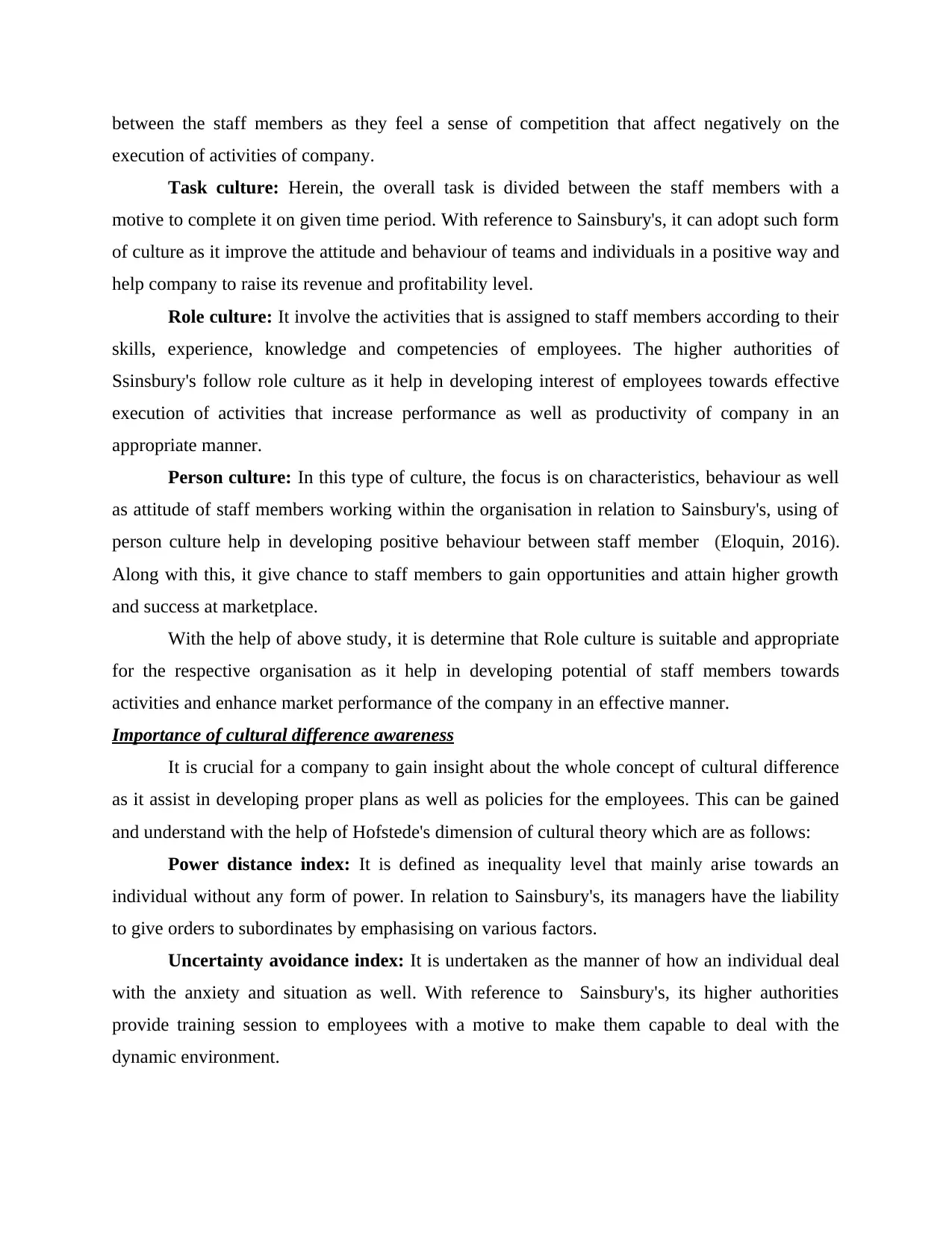
between the staff members as they feel a sense of competition that affect negatively on the
execution of activities of company.
Task culture: Herein, the overall task is divided between the staff members with a
motive to complete it on given time period. With reference to Sainsbury's, it can adopt such form
of culture as it improve the attitude and behaviour of teams and individuals in a positive way and
help company to raise its revenue and profitability level.
Role culture: It involve the activities that is assigned to staff members according to their
skills, experience, knowledge and competencies of employees. The higher authorities of
Ssinsbury's follow role culture as it help in developing interest of employees towards effective
execution of activities that increase performance as well as productivity of company in an
appropriate manner.
Person culture: In this type of culture, the focus is on characteristics, behaviour as well
as attitude of staff members working within the organisation in relation to Sainsbury's, using of
person culture help in developing positive behaviour between staff member (Eloquin, 2016).
Along with this, it give chance to staff members to gain opportunities and attain higher growth
and success at marketplace.
With the help of above study, it is determine that Role culture is suitable and appropriate
for the respective organisation as it help in developing potential of staff members towards
activities and enhance market performance of the company in an effective manner.
Importance of cultural difference awareness
It is crucial for a company to gain insight about the whole concept of cultural difference
as it assist in developing proper plans as well as policies for the employees. This can be gained
and understand with the help of Hofstede's dimension of cultural theory which are as follows:
Power distance index: It is defined as inequality level that mainly arise towards an
individual without any form of power. In relation to Sainsbury's, its managers have the liability
to give orders to subordinates by emphasising on various factors.
Uncertainty avoidance index: It is undertaken as the manner of how an individual deal
with the anxiety and situation as well. With reference to Sainsbury's, its higher authorities
provide training session to employees with a motive to make them capable to deal with the
dynamic environment.
execution of activities of company.
Task culture: Herein, the overall task is divided between the staff members with a
motive to complete it on given time period. With reference to Sainsbury's, it can adopt such form
of culture as it improve the attitude and behaviour of teams and individuals in a positive way and
help company to raise its revenue and profitability level.
Role culture: It involve the activities that is assigned to staff members according to their
skills, experience, knowledge and competencies of employees. The higher authorities of
Ssinsbury's follow role culture as it help in developing interest of employees towards effective
execution of activities that increase performance as well as productivity of company in an
appropriate manner.
Person culture: In this type of culture, the focus is on characteristics, behaviour as well
as attitude of staff members working within the organisation in relation to Sainsbury's, using of
person culture help in developing positive behaviour between staff member (Eloquin, 2016).
Along with this, it give chance to staff members to gain opportunities and attain higher growth
and success at marketplace.
With the help of above study, it is determine that Role culture is suitable and appropriate
for the respective organisation as it help in developing potential of staff members towards
activities and enhance market performance of the company in an effective manner.
Importance of cultural difference awareness
It is crucial for a company to gain insight about the whole concept of cultural difference
as it assist in developing proper plans as well as policies for the employees. This can be gained
and understand with the help of Hofstede's dimension of cultural theory which are as follows:
Power distance index: It is defined as inequality level that mainly arise towards an
individual without any form of power. In relation to Sainsbury's, its managers have the liability
to give orders to subordinates by emphasising on various factors.
Uncertainty avoidance index: It is undertaken as the manner of how an individual deal
with the anxiety and situation as well. With reference to Sainsbury's, its higher authorities
provide training session to employees with a motive to make them capable to deal with the
dynamic environment.
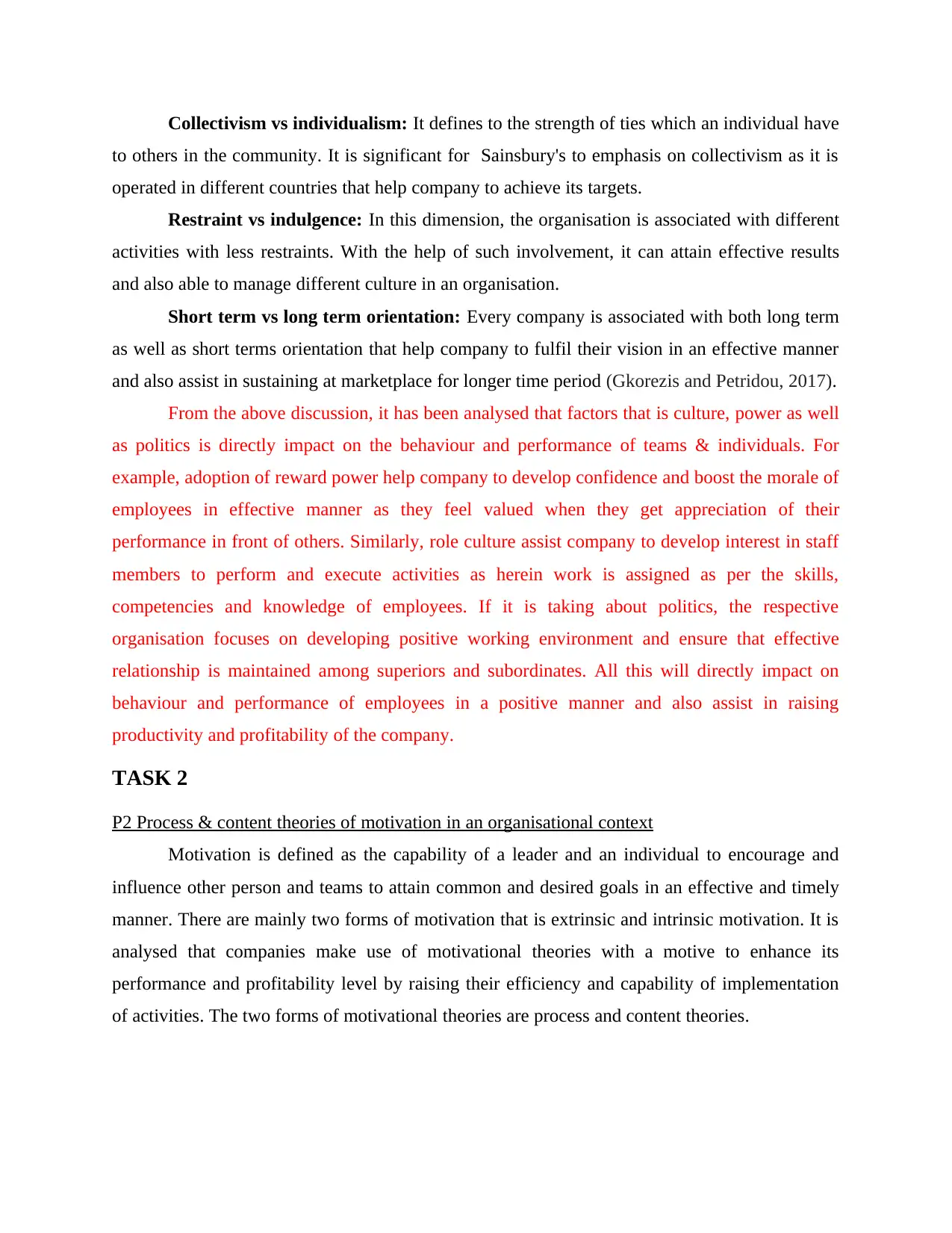
Collectivism vs individualism: It defines to the strength of ties which an individual have
to others in the community. It is significant for Sainsbury's to emphasis on collectivism as it is
operated in different countries that help company to achieve its targets.
Restraint vs indulgence: In this dimension, the organisation is associated with different
activities with less restraints. With the help of such involvement, it can attain effective results
and also able to manage different culture in an organisation.
Short term vs long term orientation: Every company is associated with both long term
as well as short terms orientation that help company to fulfil their vision in an effective manner
and also assist in sustaining at marketplace for longer time period (Gkorezis and Petridou, 2017).
From the above discussion, it has been analysed that factors that is culture, power as well
as politics is directly impact on the behaviour and performance of teams & individuals. For
example, adoption of reward power help company to develop confidence and boost the morale of
employees in effective manner as they feel valued when they get appreciation of their
performance in front of others. Similarly, role culture assist company to develop interest in staff
members to perform and execute activities as herein work is assigned as per the skills,
competencies and knowledge of employees. If it is taking about politics, the respective
organisation focuses on developing positive working environment and ensure that effective
relationship is maintained among superiors and subordinates. All this will directly impact on
behaviour and performance of employees in a positive manner and also assist in raising
productivity and profitability of the company.
TASK 2
P2 Process & content theories of motivation in an organisational context
Motivation is defined as the capability of a leader and an individual to encourage and
influence other person and teams to attain common and desired goals in an effective and timely
manner. There are mainly two forms of motivation that is extrinsic and intrinsic motivation. It is
analysed that companies make use of motivational theories with a motive to enhance its
performance and profitability level by raising their efficiency and capability of implementation
of activities. The two forms of motivational theories are process and content theories.
to others in the community. It is significant for Sainsbury's to emphasis on collectivism as it is
operated in different countries that help company to achieve its targets.
Restraint vs indulgence: In this dimension, the organisation is associated with different
activities with less restraints. With the help of such involvement, it can attain effective results
and also able to manage different culture in an organisation.
Short term vs long term orientation: Every company is associated with both long term
as well as short terms orientation that help company to fulfil their vision in an effective manner
and also assist in sustaining at marketplace for longer time period (Gkorezis and Petridou, 2017).
From the above discussion, it has been analysed that factors that is culture, power as well
as politics is directly impact on the behaviour and performance of teams & individuals. For
example, adoption of reward power help company to develop confidence and boost the morale of
employees in effective manner as they feel valued when they get appreciation of their
performance in front of others. Similarly, role culture assist company to develop interest in staff
members to perform and execute activities as herein work is assigned as per the skills,
competencies and knowledge of employees. If it is taking about politics, the respective
organisation focuses on developing positive working environment and ensure that effective
relationship is maintained among superiors and subordinates. All this will directly impact on
behaviour and performance of employees in a positive manner and also assist in raising
productivity and profitability of the company.
TASK 2
P2 Process & content theories of motivation in an organisational context
Motivation is defined as the capability of a leader and an individual to encourage and
influence other person and teams to attain common and desired goals in an effective and timely
manner. There are mainly two forms of motivation that is extrinsic and intrinsic motivation. It is
analysed that companies make use of motivational theories with a motive to enhance its
performance and profitability level by raising their efficiency and capability of implementation
of activities. The two forms of motivational theories are process and content theories.
⊘ This is a preview!⊘
Do you want full access?
Subscribe today to unlock all pages.

Trusted by 1+ million students worldwide
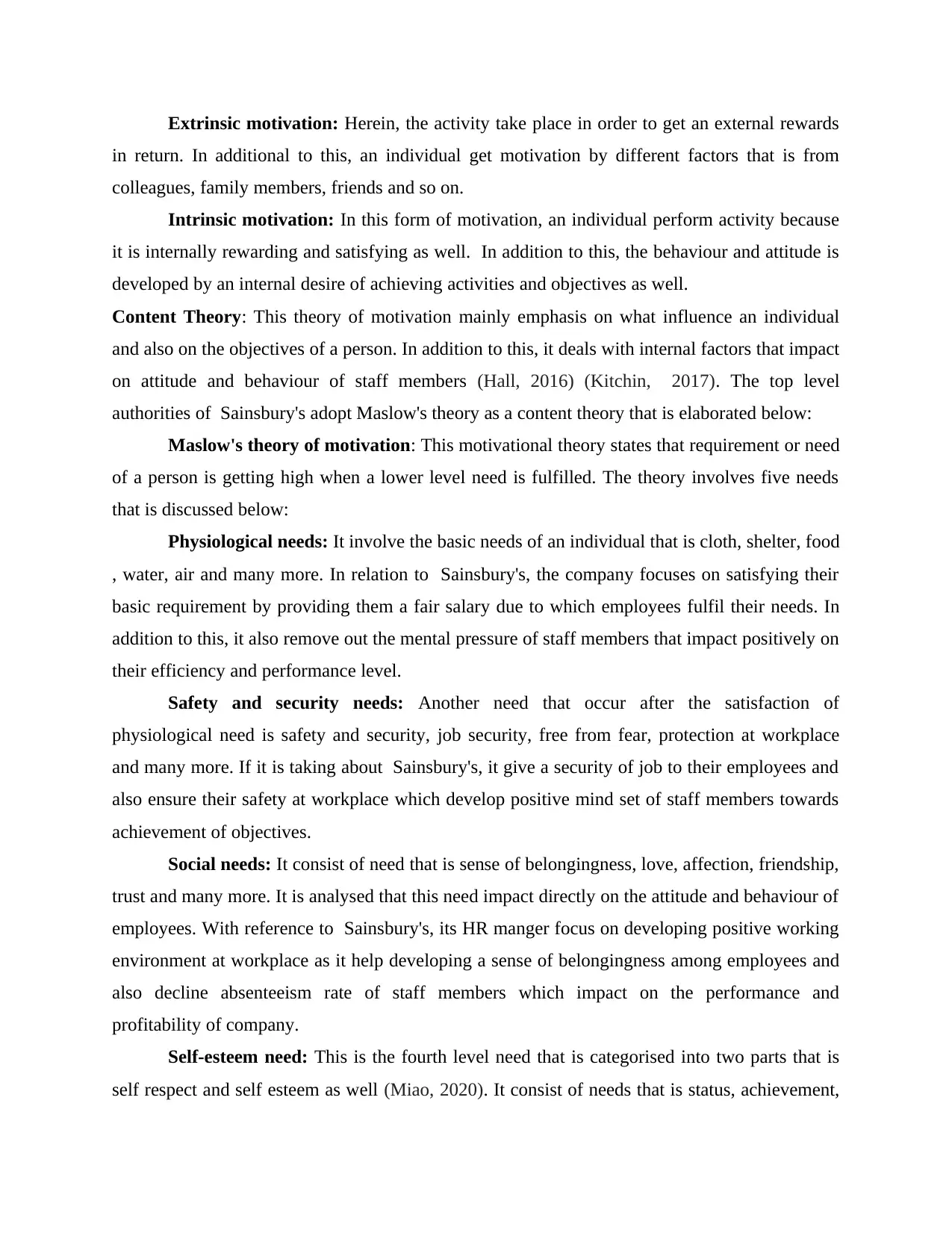
Extrinsic motivation: Herein, the activity take place in order to get an external rewards
in return. In additional to this, an individual get motivation by different factors that is from
colleagues, family members, friends and so on.
Intrinsic motivation: In this form of motivation, an individual perform activity because
it is internally rewarding and satisfying as well. In addition to this, the behaviour and attitude is
developed by an internal desire of achieving activities and objectives as well.
Content Theory: This theory of motivation mainly emphasis on what influence an individual
and also on the objectives of a person. In addition to this, it deals with internal factors that impact
on attitude and behaviour of staff members (Hall, 2016) (Kitchin, 2017). The top level
authorities of Sainsbury's adopt Maslow's theory as a content theory that is elaborated below:
Maslow's theory of motivation: This motivational theory states that requirement or need
of a person is getting high when a lower level need is fulfilled. The theory involves five needs
that is discussed below:
Physiological needs: It involve the basic needs of an individual that is cloth, shelter, food
, water, air and many more. In relation to Sainsbury's, the company focuses on satisfying their
basic requirement by providing them a fair salary due to which employees fulfil their needs. In
addition to this, it also remove out the mental pressure of staff members that impact positively on
their efficiency and performance level.
Safety and security needs: Another need that occur after the satisfaction of
physiological need is safety and security, job security, free from fear, protection at workplace
and many more. If it is taking about Sainsbury's, it give a security of job to their employees and
also ensure their safety at workplace which develop positive mind set of staff members towards
achievement of objectives.
Social needs: It consist of need that is sense of belongingness, love, affection, friendship,
trust and many more. It is analysed that this need impact directly on the attitude and behaviour of
employees. With reference to Sainsbury's, its HR manger focus on developing positive working
environment at workplace as it help developing a sense of belongingness among employees and
also decline absenteeism rate of staff members which impact on the performance and
profitability of company.
Self-esteem need: This is the fourth level need that is categorised into two parts that is
self respect and self esteem as well (Miao, 2020). It consist of needs that is status, achievement,
in return. In additional to this, an individual get motivation by different factors that is from
colleagues, family members, friends and so on.
Intrinsic motivation: In this form of motivation, an individual perform activity because
it is internally rewarding and satisfying as well. In addition to this, the behaviour and attitude is
developed by an internal desire of achieving activities and objectives as well.
Content Theory: This theory of motivation mainly emphasis on what influence an individual
and also on the objectives of a person. In addition to this, it deals with internal factors that impact
on attitude and behaviour of staff members (Hall, 2016) (Kitchin, 2017). The top level
authorities of Sainsbury's adopt Maslow's theory as a content theory that is elaborated below:
Maslow's theory of motivation: This motivational theory states that requirement or need
of a person is getting high when a lower level need is fulfilled. The theory involves five needs
that is discussed below:
Physiological needs: It involve the basic needs of an individual that is cloth, shelter, food
, water, air and many more. In relation to Sainsbury's, the company focuses on satisfying their
basic requirement by providing them a fair salary due to which employees fulfil their needs. In
addition to this, it also remove out the mental pressure of staff members that impact positively on
their efficiency and performance level.
Safety and security needs: Another need that occur after the satisfaction of
physiological need is safety and security, job security, free from fear, protection at workplace
and many more. If it is taking about Sainsbury's, it give a security of job to their employees and
also ensure their safety at workplace which develop positive mind set of staff members towards
achievement of objectives.
Social needs: It consist of need that is sense of belongingness, love, affection, friendship,
trust and many more. It is analysed that this need impact directly on the attitude and behaviour of
employees. With reference to Sainsbury's, its HR manger focus on developing positive working
environment at workplace as it help developing a sense of belongingness among employees and
also decline absenteeism rate of staff members which impact on the performance and
profitability of company.
Self-esteem need: This is the fourth level need that is categorised into two parts that is
self respect and self esteem as well (Miao, 2020). It consist of needs that is status, achievement,
Paraphrase This Document
Need a fresh take? Get an instant paraphrase of this document with our AI Paraphraser
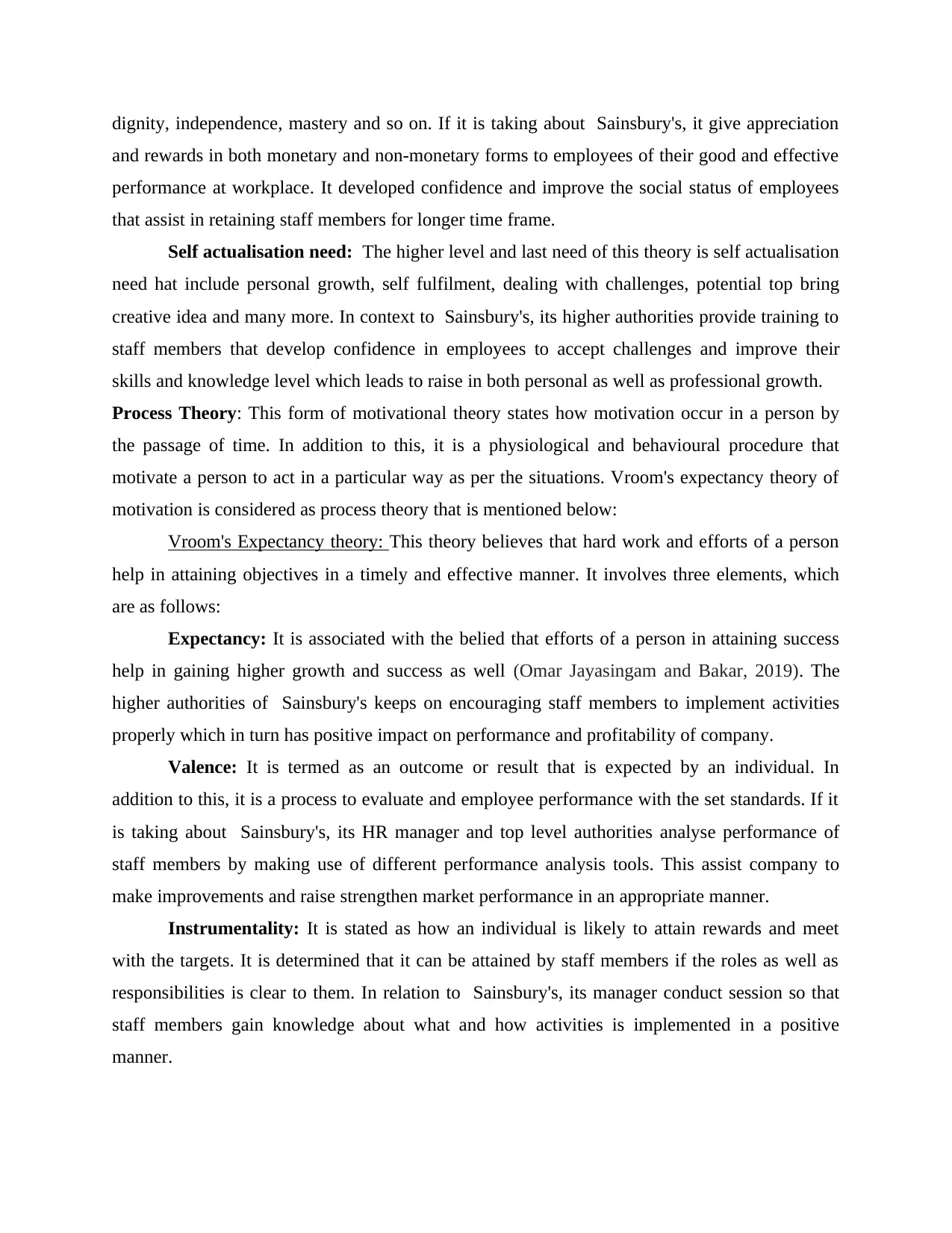
dignity, independence, mastery and so on. If it is taking about Sainsbury's, it give appreciation
and rewards in both monetary and non-monetary forms to employees of their good and effective
performance at workplace. It developed confidence and improve the social status of employees
that assist in retaining staff members for longer time frame.
Self actualisation need: The higher level and last need of this theory is self actualisation
need hat include personal growth, self fulfilment, dealing with challenges, potential top bring
creative idea and many more. In context to Sainsbury's, its higher authorities provide training to
staff members that develop confidence in employees to accept challenges and improve their
skills and knowledge level which leads to raise in both personal as well as professional growth.
Process Theory: This form of motivational theory states how motivation occur in a person by
the passage of time. In addition to this, it is a physiological and behavioural procedure that
motivate a person to act in a particular way as per the situations. Vroom's expectancy theory of
motivation is considered as process theory that is mentioned below:
Vroom's Expectancy theory: This theory believes that hard work and efforts of a person
help in attaining objectives in a timely and effective manner. It involves three elements, which
are as follows:
Expectancy: It is associated with the belied that efforts of a person in attaining success
help in gaining higher growth and success as well (Omar Jayasingam and Bakar, 2019). The
higher authorities of Sainsbury's keeps on encouraging staff members to implement activities
properly which in turn has positive impact on performance and profitability of company.
Valence: It is termed as an outcome or result that is expected by an individual. In
addition to this, it is a process to evaluate and employee performance with the set standards. If it
is taking about Sainsbury's, its HR manager and top level authorities analyse performance of
staff members by making use of different performance analysis tools. This assist company to
make improvements and raise strengthen market performance in an appropriate manner.
Instrumentality: It is stated as how an individual is likely to attain rewards and meet
with the targets. It is determined that it can be attained by staff members if the roles as well as
responsibilities is clear to them. In relation to Sainsbury's, its manager conduct session so that
staff members gain knowledge about what and how activities is implemented in a positive
manner.
and rewards in both monetary and non-monetary forms to employees of their good and effective
performance at workplace. It developed confidence and improve the social status of employees
that assist in retaining staff members for longer time frame.
Self actualisation need: The higher level and last need of this theory is self actualisation
need hat include personal growth, self fulfilment, dealing with challenges, potential top bring
creative idea and many more. In context to Sainsbury's, its higher authorities provide training to
staff members that develop confidence in employees to accept challenges and improve their
skills and knowledge level which leads to raise in both personal as well as professional growth.
Process Theory: This form of motivational theory states how motivation occur in a person by
the passage of time. In addition to this, it is a physiological and behavioural procedure that
motivate a person to act in a particular way as per the situations. Vroom's expectancy theory of
motivation is considered as process theory that is mentioned below:
Vroom's Expectancy theory: This theory believes that hard work and efforts of a person
help in attaining objectives in a timely and effective manner. It involves three elements, which
are as follows:
Expectancy: It is associated with the belied that efforts of a person in attaining success
help in gaining higher growth and success as well (Omar Jayasingam and Bakar, 2019). The
higher authorities of Sainsbury's keeps on encouraging staff members to implement activities
properly which in turn has positive impact on performance and profitability of company.
Valence: It is termed as an outcome or result that is expected by an individual. In
addition to this, it is a process to evaluate and employee performance with the set standards. If it
is taking about Sainsbury's, its HR manager and top level authorities analyse performance of
staff members by making use of different performance analysis tools. This assist company to
make improvements and raise strengthen market performance in an appropriate manner.
Instrumentality: It is stated as how an individual is likely to attain rewards and meet
with the targets. It is determined that it can be attained by staff members if the roles as well as
responsibilities is clear to them. In relation to Sainsbury's, its manager conduct session so that
staff members gain knowledge about what and how activities is implemented in a positive
manner.
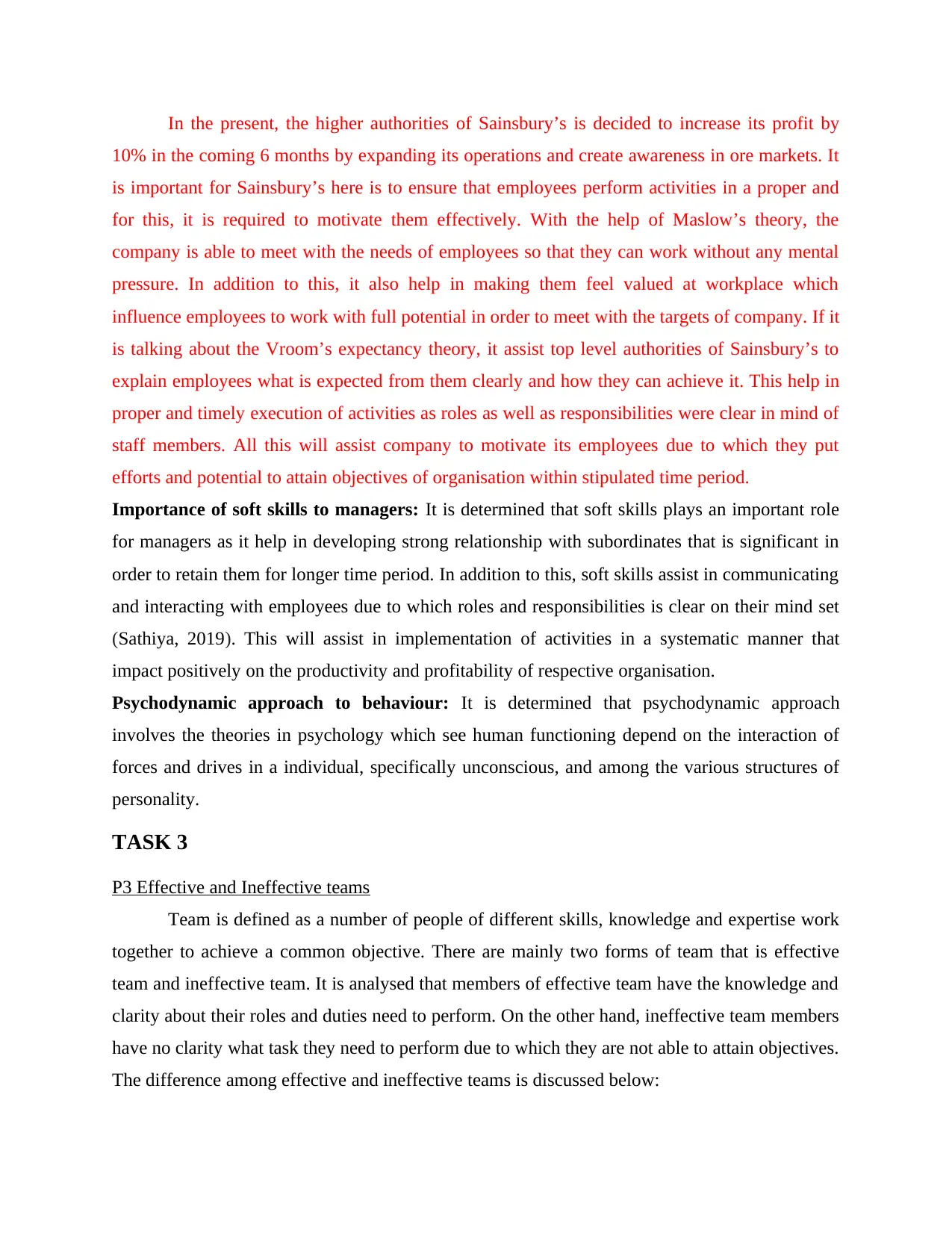
In the present, the higher authorities of Sainsbury’s is decided to increase its profit by
10% in the coming 6 months by expanding its operations and create awareness in ore markets. It
is important for Sainsbury’s here is to ensure that employees perform activities in a proper and
for this, it is required to motivate them effectively. With the help of Maslow’s theory, the
company is able to meet with the needs of employees so that they can work without any mental
pressure. In addition to this, it also help in making them feel valued at workplace which
influence employees to work with full potential in order to meet with the targets of company. If it
is talking about the Vroom’s expectancy theory, it assist top level authorities of Sainsbury’s to
explain employees what is expected from them clearly and how they can achieve it. This help in
proper and timely execution of activities as roles as well as responsibilities were clear in mind of
staff members. All this will assist company to motivate its employees due to which they put
efforts and potential to attain objectives of organisation within stipulated time period.
Importance of soft skills to managers: It is determined that soft skills plays an important role
for managers as it help in developing strong relationship with subordinates that is significant in
order to retain them for longer time period. In addition to this, soft skills assist in communicating
and interacting with employees due to which roles and responsibilities is clear on their mind set
(Sathiya, 2019). This will assist in implementation of activities in a systematic manner that
impact positively on the productivity and profitability of respective organisation.
Psychodynamic approach to behaviour: It is determined that psychodynamic approach
involves the theories in psychology which see human functioning depend on the interaction of
forces and drives in a individual, specifically unconscious, and among the various structures of
personality.
TASK 3
P3 Effective and Ineffective teams
Team is defined as a number of people of different skills, knowledge and expertise work
together to achieve a common objective. There are mainly two forms of team that is effective
team and ineffective team. It is analysed that members of effective team have the knowledge and
clarity about their roles and duties need to perform. On the other hand, ineffective team members
have no clarity what task they need to perform due to which they are not able to attain objectives.
The difference among effective and ineffective teams is discussed below:
10% in the coming 6 months by expanding its operations and create awareness in ore markets. It
is important for Sainsbury’s here is to ensure that employees perform activities in a proper and
for this, it is required to motivate them effectively. With the help of Maslow’s theory, the
company is able to meet with the needs of employees so that they can work without any mental
pressure. In addition to this, it also help in making them feel valued at workplace which
influence employees to work with full potential in order to meet with the targets of company. If it
is talking about the Vroom’s expectancy theory, it assist top level authorities of Sainsbury’s to
explain employees what is expected from them clearly and how they can achieve it. This help in
proper and timely execution of activities as roles as well as responsibilities were clear in mind of
staff members. All this will assist company to motivate its employees due to which they put
efforts and potential to attain objectives of organisation within stipulated time period.
Importance of soft skills to managers: It is determined that soft skills plays an important role
for managers as it help in developing strong relationship with subordinates that is significant in
order to retain them for longer time period. In addition to this, soft skills assist in communicating
and interacting with employees due to which roles and responsibilities is clear on their mind set
(Sathiya, 2019). This will assist in implementation of activities in a systematic manner that
impact positively on the productivity and profitability of respective organisation.
Psychodynamic approach to behaviour: It is determined that psychodynamic approach
involves the theories in psychology which see human functioning depend on the interaction of
forces and drives in a individual, specifically unconscious, and among the various structures of
personality.
TASK 3
P3 Effective and Ineffective teams
Team is defined as a number of people of different skills, knowledge and expertise work
together to achieve a common objective. There are mainly two forms of team that is effective
team and ineffective team. It is analysed that members of effective team have the knowledge and
clarity about their roles and duties need to perform. On the other hand, ineffective team members
have no clarity what task they need to perform due to which they are not able to attain objectives.
The difference among effective and ineffective teams is discussed below:
⊘ This is a preview!⊘
Do you want full access?
Subscribe today to unlock all pages.

Trusted by 1+ million students worldwide
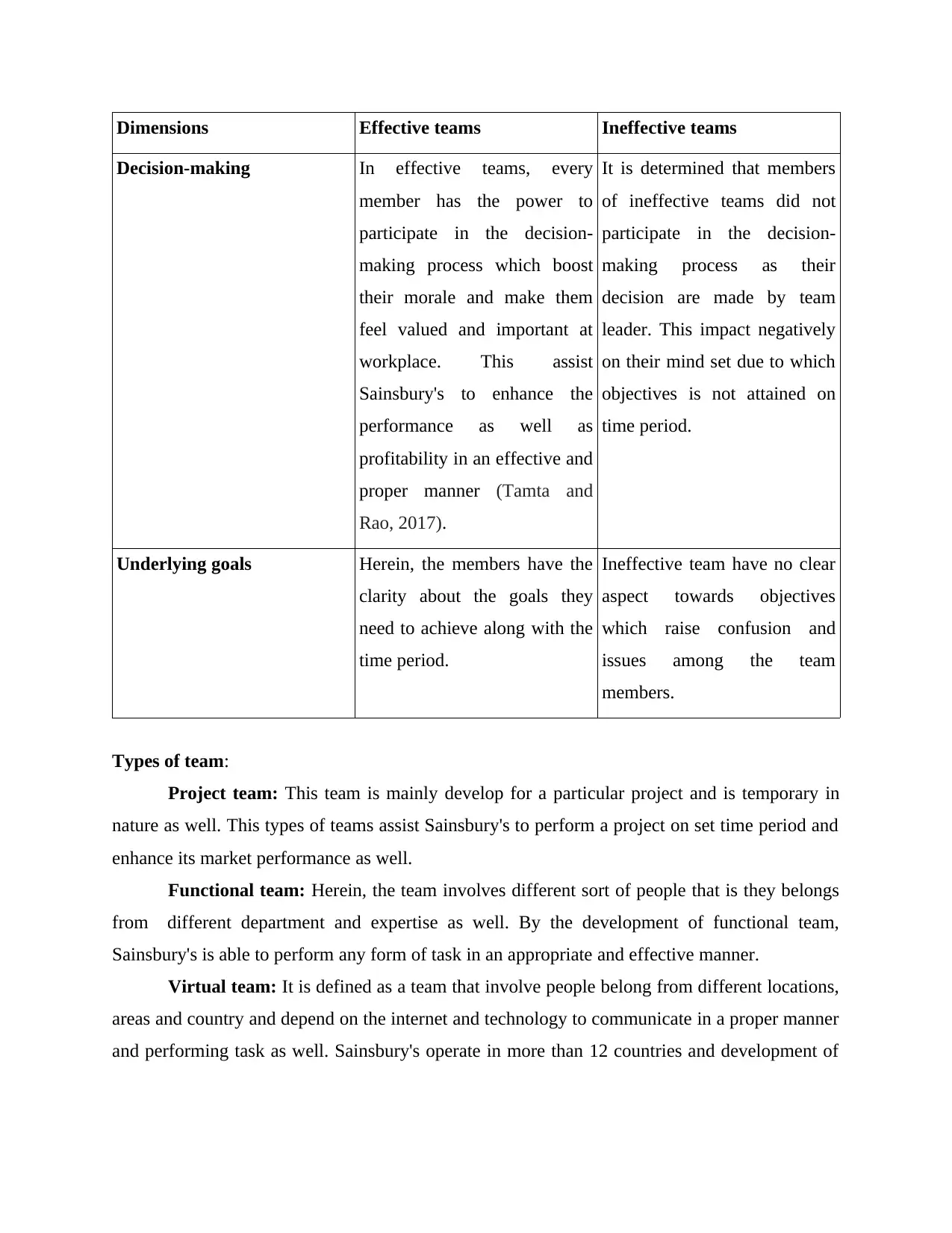
Dimensions Effective teams Ineffective teams
Decision-making In effective teams, every
member has the power to
participate in the decision-
making process which boost
their morale and make them
feel valued and important at
workplace. This assist
Sainsbury's to enhance the
performance as well as
profitability in an effective and
proper manner (Tamta and
Rao, 2017).
It is determined that members
of ineffective teams did not
participate in the decision-
making process as their
decision are made by team
leader. This impact negatively
on their mind set due to which
objectives is not attained on
time period.
Underlying goals Herein, the members have the
clarity about the goals they
need to achieve along with the
time period.
Ineffective team have no clear
aspect towards objectives
which raise confusion and
issues among the team
members.
Types of team:
Project team: This team is mainly develop for a particular project and is temporary in
nature as well. This types of teams assist Sainsbury's to perform a project on set time period and
enhance its market performance as well.
Functional team: Herein, the team involves different sort of people that is they belongs
from different department and expertise as well. By the development of functional team,
Sainsbury's is able to perform any form of task in an appropriate and effective manner.
Virtual team: It is defined as a team that involve people belong from different locations,
areas and country and depend on the internet and technology to communicate in a proper manner
and performing task as well. Sainsbury's operate in more than 12 countries and development of
Decision-making In effective teams, every
member has the power to
participate in the decision-
making process which boost
their morale and make them
feel valued and important at
workplace. This assist
Sainsbury's to enhance the
performance as well as
profitability in an effective and
proper manner (Tamta and
Rao, 2017).
It is determined that members
of ineffective teams did not
participate in the decision-
making process as their
decision are made by team
leader. This impact negatively
on their mind set due to which
objectives is not attained on
time period.
Underlying goals Herein, the members have the
clarity about the goals they
need to achieve along with the
time period.
Ineffective team have no clear
aspect towards objectives
which raise confusion and
issues among the team
members.
Types of team:
Project team: This team is mainly develop for a particular project and is temporary in
nature as well. This types of teams assist Sainsbury's to perform a project on set time period and
enhance its market performance as well.
Functional team: Herein, the team involves different sort of people that is they belongs
from different department and expertise as well. By the development of functional team,
Sainsbury's is able to perform any form of task in an appropriate and effective manner.
Virtual team: It is defined as a team that involve people belong from different locations,
areas and country and depend on the internet and technology to communicate in a proper manner
and performing task as well. Sainsbury's operate in more than 12 countries and development of
Paraphrase This Document
Need a fresh take? Get an instant paraphrase of this document with our AI Paraphraser
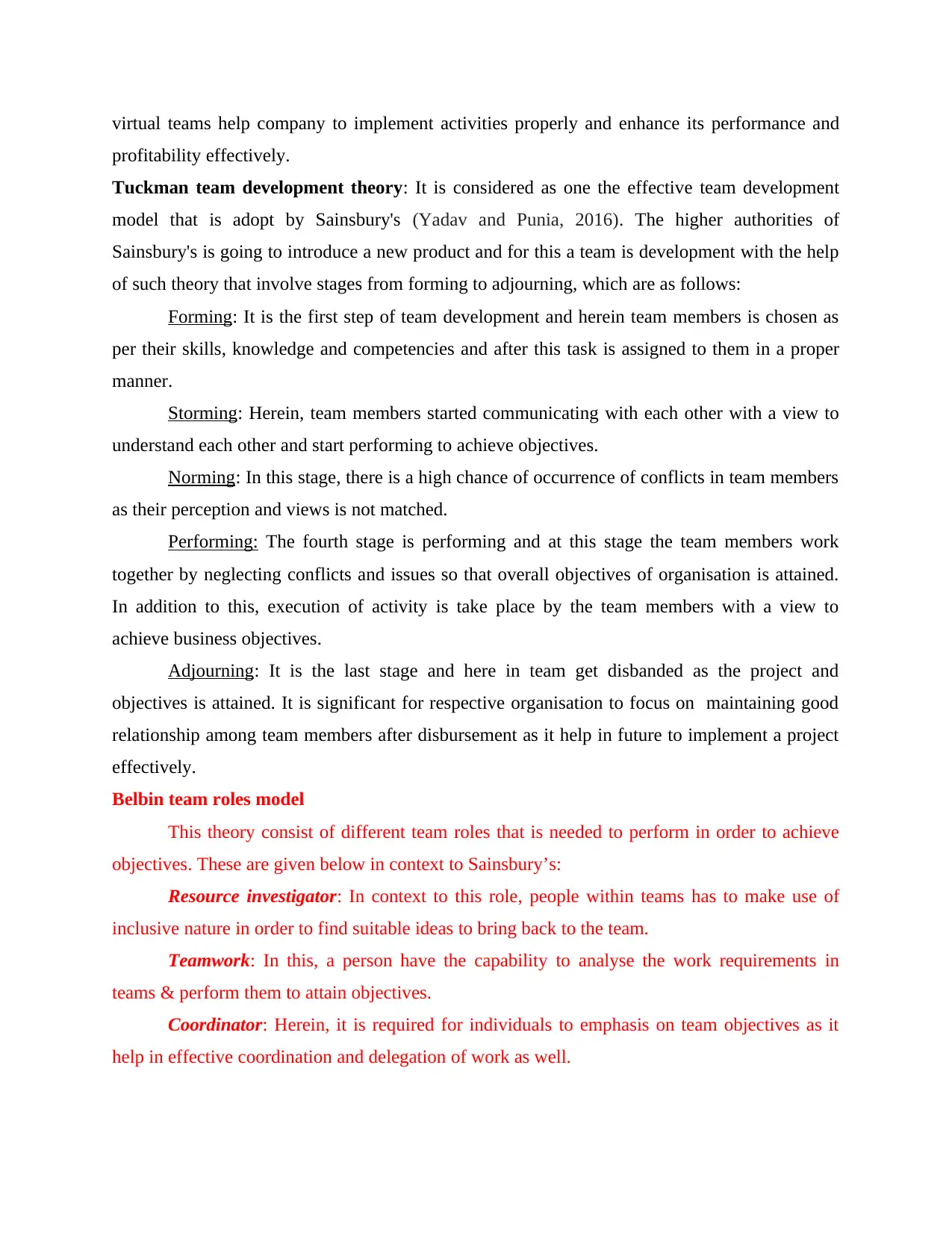
virtual teams help company to implement activities properly and enhance its performance and
profitability effectively.
Tuckman team development theory: It is considered as one the effective team development
model that is adopt by Sainsbury's (Yadav and Punia, 2016). The higher authorities of
Sainsbury's is going to introduce a new product and for this a team is development with the help
of such theory that involve stages from forming to adjourning, which are as follows:
Forming: It is the first step of team development and herein team members is chosen as
per their skills, knowledge and competencies and after this task is assigned to them in a proper
manner.
Storming: Herein, team members started communicating with each other with a view to
understand each other and start performing to achieve objectives.
Norming: In this stage, there is a high chance of occurrence of conflicts in team members
as their perception and views is not matched.
Performing: The fourth stage is performing and at this stage the team members work
together by neglecting conflicts and issues so that overall objectives of organisation is attained.
In addition to this, execution of activity is take place by the team members with a view to
achieve business objectives.
Adjourning: It is the last stage and here in team get disbanded as the project and
objectives is attained. It is significant for respective organisation to focus on maintaining good
relationship among team members after disbursement as it help in future to implement a project
effectively.
Belbin team roles model
This theory consist of different team roles that is needed to perform in order to achieve
objectives. These are given below in context to Sainsbury’s:
Resource investigator: In context to this role, people within teams has to make use of
inclusive nature in order to find suitable ideas to bring back to the team.
Teamwork: In this, a person have the capability to analyse the work requirements in
teams & perform them to attain objectives.
Coordinator: Herein, it is required for individuals to emphasis on team objectives as it
help in effective coordination and delegation of work as well.
profitability effectively.
Tuckman team development theory: It is considered as one the effective team development
model that is adopt by Sainsbury's (Yadav and Punia, 2016). The higher authorities of
Sainsbury's is going to introduce a new product and for this a team is development with the help
of such theory that involve stages from forming to adjourning, which are as follows:
Forming: It is the first step of team development and herein team members is chosen as
per their skills, knowledge and competencies and after this task is assigned to them in a proper
manner.
Storming: Herein, team members started communicating with each other with a view to
understand each other and start performing to achieve objectives.
Norming: In this stage, there is a high chance of occurrence of conflicts in team members
as their perception and views is not matched.
Performing: The fourth stage is performing and at this stage the team members work
together by neglecting conflicts and issues so that overall objectives of organisation is attained.
In addition to this, execution of activity is take place by the team members with a view to
achieve business objectives.
Adjourning: It is the last stage and here in team get disbanded as the project and
objectives is attained. It is significant for respective organisation to focus on maintaining good
relationship among team members after disbursement as it help in future to implement a project
effectively.
Belbin team roles model
This theory consist of different team roles that is needed to perform in order to achieve
objectives. These are given below in context to Sainsbury’s:
Resource investigator: In context to this role, people within teams has to make use of
inclusive nature in order to find suitable ideas to bring back to the team.
Teamwork: In this, a person have the capability to analyse the work requirements in
teams & perform them to attain objectives.
Coordinator: Herein, it is required for individuals to emphasis on team objectives as it
help in effective coordination and delegation of work as well.
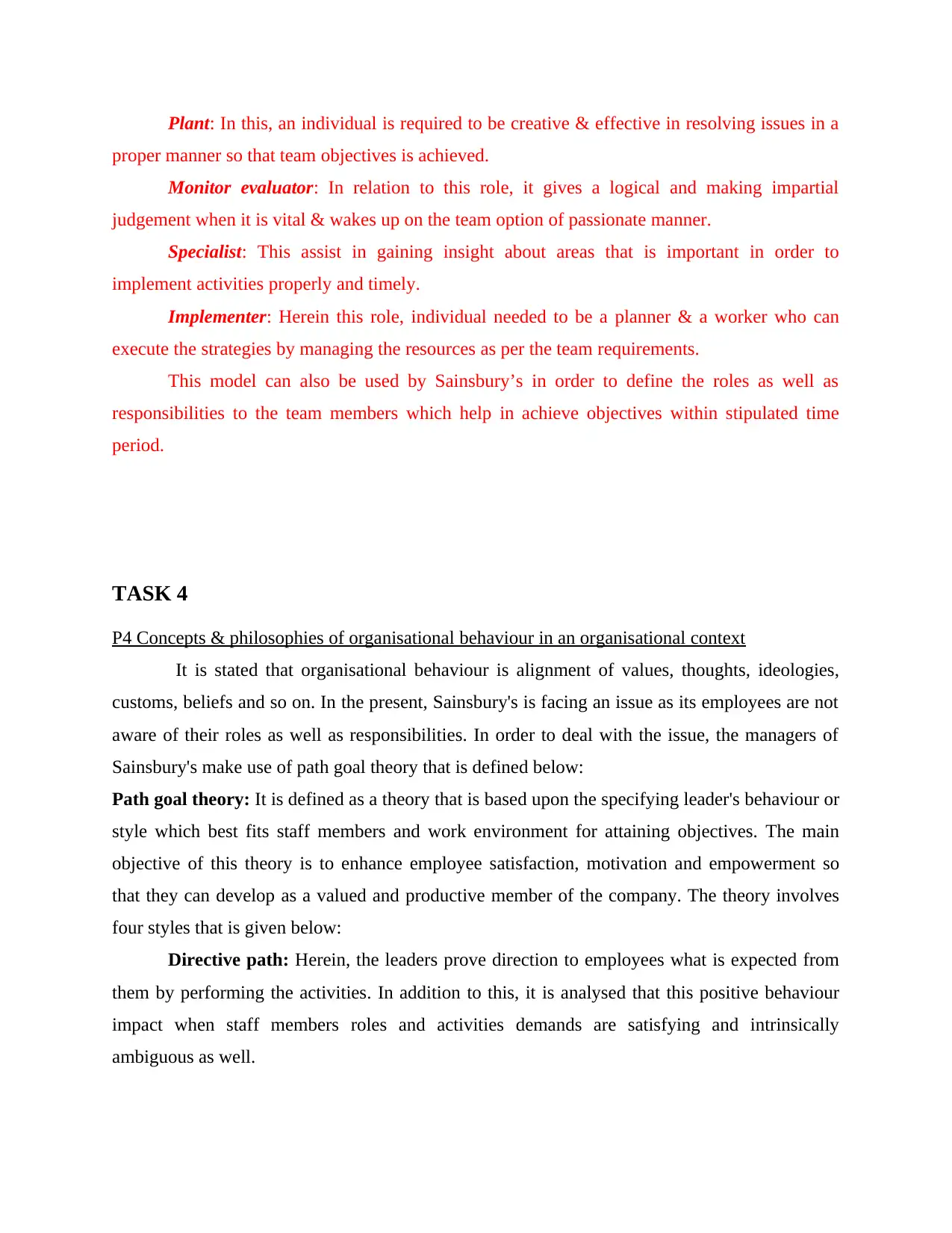
Plant: In this, an individual is required to be creative & effective in resolving issues in a
proper manner so that team objectives is achieved.
Monitor evaluator: In relation to this role, it gives a logical and making impartial
judgement when it is vital & wakes up on the team option of passionate manner.
Specialist: This assist in gaining insight about areas that is important in order to
implement activities properly and timely.
Implementer: Herein this role, individual needed to be a planner & a worker who can
execute the strategies by managing the resources as per the team requirements.
This model can also be used by Sainsbury’s in order to define the roles as well as
responsibilities to the team members which help in achieve objectives within stipulated time
period.
TASK 4
P4 Concepts & philosophies of organisational behaviour in an organisational context
It is stated that organisational behaviour is alignment of values, thoughts, ideologies,
customs, beliefs and so on. In the present, Sainsbury's is facing an issue as its employees are not
aware of their roles as well as responsibilities. In order to deal with the issue, the managers of
Sainsbury's make use of path goal theory that is defined below:
Path goal theory: It is defined as a theory that is based upon the specifying leader's behaviour or
style which best fits staff members and work environment for attaining objectives. The main
objective of this theory is to enhance employee satisfaction, motivation and empowerment so
that they can develop as a valued and productive member of the company. The theory involves
four styles that is given below:
Directive path: Herein, the leaders prove direction to employees what is expected from
them by performing the activities. In addition to this, it is analysed that this positive behaviour
impact when staff members roles and activities demands are satisfying and intrinsically
ambiguous as well.
proper manner so that team objectives is achieved.
Monitor evaluator: In relation to this role, it gives a logical and making impartial
judgement when it is vital & wakes up on the team option of passionate manner.
Specialist: This assist in gaining insight about areas that is important in order to
implement activities properly and timely.
Implementer: Herein this role, individual needed to be a planner & a worker who can
execute the strategies by managing the resources as per the team requirements.
This model can also be used by Sainsbury’s in order to define the roles as well as
responsibilities to the team members which help in achieve objectives within stipulated time
period.
TASK 4
P4 Concepts & philosophies of organisational behaviour in an organisational context
It is stated that organisational behaviour is alignment of values, thoughts, ideologies,
customs, beliefs and so on. In the present, Sainsbury's is facing an issue as its employees are not
aware of their roles as well as responsibilities. In order to deal with the issue, the managers of
Sainsbury's make use of path goal theory that is defined below:
Path goal theory: It is defined as a theory that is based upon the specifying leader's behaviour or
style which best fits staff members and work environment for attaining objectives. The main
objective of this theory is to enhance employee satisfaction, motivation and empowerment so
that they can develop as a valued and productive member of the company. The theory involves
four styles that is given below:
Directive path: Herein, the leaders prove direction to employees what is expected from
them by performing the activities. In addition to this, it is analysed that this positive behaviour
impact when staff members roles and activities demands are satisfying and intrinsically
ambiguous as well.
⊘ This is a preview!⊘
Do you want full access?
Subscribe today to unlock all pages.

Trusted by 1+ million students worldwide
1 out of 16
Related Documents
Your All-in-One AI-Powered Toolkit for Academic Success.
+13062052269
info@desklib.com
Available 24*7 on WhatsApp / Email
![[object Object]](/_next/static/media/star-bottom.7253800d.svg)
Unlock your academic potential
Copyright © 2020–2026 A2Z Services. All Rights Reserved. Developed and managed by ZUCOL.




